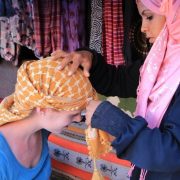
Originally published on Egypt Today
By Dina Ghalwash
Whether you’ve donned the hijab recently or been wearing it for decades, most women covering their hair seem to share the same problems, ranging from flat hair/no volume or curl, dry or brittle hair, breakage, frizz, receding hairlines or hair loss and inability to grow their hair. So how do you start your healthy hair journey to see your hair turn into the beautiful mane you remember once having? Here are a few things you can do.
Wet or damp hair is very sensitive and is more prone to breakage than dry hair. Pulling your hair back in a ponytail and placing the hijab on it, while wet, will lead directly to hair fall and frizz. So always dry your hair before putting on your hijab.
Wash your hair on a day you know you’ll be staying home until your hair fully dries to avoid as much damage as possible. If you’re a swimmer or regular gym-goer and wash your hair on a daily basis, try wearing a satin scarf instead of a cotton one to avoid friction and damage.
Change it up and wear your hair in different protective styles and in different ways. For example, most ladies wear a ponytail or a bun under their hijabs, all the time. But to avoid hair breakage and damage you have to change your go-to styles often. For example, what about tying your hair in a loose braid? That’s an easy hairstyle change. Or instead of placing your ponytail in the same place, every time, move the ponytail higher or lower on your head.
Alternatively, go for a side-parted ponytail, instead of a tightly pulled-back ponytail to avoid hair fall and receding hairlines.
Finally, you should not only change your hairstyle under the hijab, but where you part your hair must also change every once in a while. When wet, if you usually part your hair on the right, simply give yourself a side part on the left, or down the middle, and let it dry this way. The side part naturally gives your hair extra volume, which helps when you remove the veil at night.






